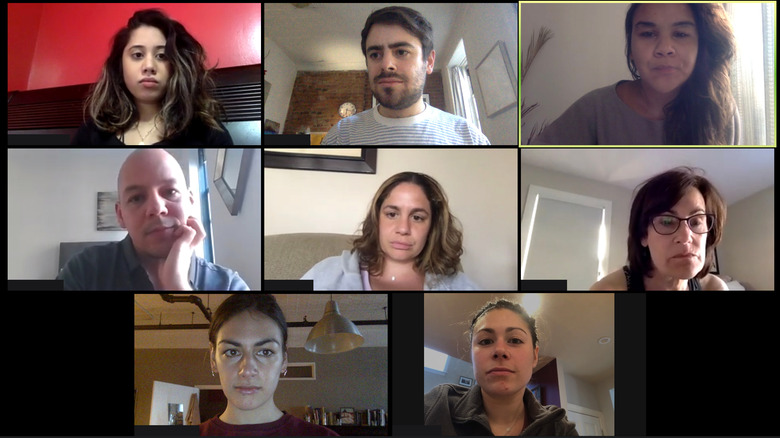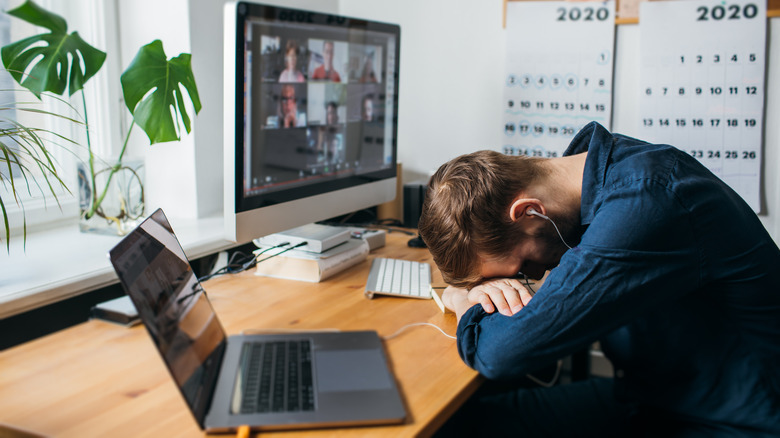These Body Language Mistakes You're Making On Zoom Send The Wrong Message
Last year, once the lockdowns hit, many of us experienced something we'd had little to no experience of in the past: having all of our interaction taking place in a virtual space. Okay, so many Gen-Z kids were already well-versed in video chatting with far-flung friends since they've regarded the entire globe as their social sphere pretty much since the time they were born. Millennials and up, however, were more used to meeting face-to-face, whether it be with friends or colleagues. Forced into a new world of Zoom meetings and meet-ups, many struggled with what to wear, how to act, and how to deal with the tiredness that set in after spending a few hours on camera. Suddenly "Zoom fatigue" became part of our vocabulary as well as our day-to-day reality.
By now we're pretty used to Zooming, which is a good thing. Even as workplaces open up, many speculate that Zoom meetings may well replace business travel to a great extent as there's no denying it's much, much cheaper for companies than covering employees' travel costs and per diem expenses. (Sorry, frequent fliers, but the "new normal" is what it is.) Still, some of us are growing complacent in our Zooming, so body language expert Austin Iuliano spoke with The List to let us know some of the mistakes we should be on the lookout for.
Don't let your face give the wrong message
"When we are on Zoom," says Iuliano, "the only thing our audience is looking at is our face." Well, mostly. That wasn't the case when a certain unfortunate Canadian member of parliament was caught on camera butt-naked (via BBC News) — so yeah, you should still wear a clean shirt, and pants of some sort would be a good idea, too. Still, if you're decently clothed, then, as Iuliano points out, your face is the only thing people have to focus on when you're speaking, so all your body language is really "face language." As he tells us, "We have to be conscious of the micro expressions our face makes when we are speaking."
Something else to keep in mind, says Iuliano, is to "look at the camera, not your face," calling it "the simplest trick to being more charismatic on camera." Doing so, he says, will allow you to better connect with your audience.
Practice your on-camera speaking skills
While everybody's heard that the camera puts on 10 pounds, Iuliano says the Zoom corollary is that "the [web] camera also reduces your energy output by 20%." He says this means you have to increase the energy you project and, instead of giving 100%, give 120% (assuming you can figure out the math behind calculating the precise amount of energy you're conveying).
If you're wondering how you can possibly do that, and/or you are suffering from a certain amount of Zoom "stage fright," Iuliano has an answer for that, too: practice, practice, practice. "Practice makes perfect," he says, and goes on to explain that "speaking from both personal experience and those of my clients, the more you practice speaking on camera the easier it becomes."
While public speaking may be many people's biggest fear, speaking on camera, he thinks, ranks a close second, so you may wish to solicit input from others whose on-camera presentation skills you admire. Even if you don't have access to such help, though, you can practice on your own so as to become better used to looking at the camera, controlling your facial expressions, and coming across as energetic as humanly possible without requiring a constant caffeine infusion (since constantly breaking away from your Zoom call to run to the bathroom is probably not the kind of image you want to project).
Don't let the meetings drag on too long
This last tip may not be relevant if you're at a middle or lower level within your company's structure and don't have any input into how meetings are structured, but if you'll be the one running a Zoom meeting, listen up! Iuliano says it's important to "know the end goal of the meeting and only focus on that goal." If you can manage to be direct and results-oriented, and you also have the necessary diplomatic skills to steer the rest of your meeting's participants in this same direction, then you should be able to take care of business without taking up too much of anybody's time that might be better spent working on other projects.
If the meeting participants know you plan to keep things as short as possible, Iuliano thinks this should "increase the attention of all on the calls." He cautions, though: "Don't have meetings unless absolutely necessary and only invite relevant parties."



